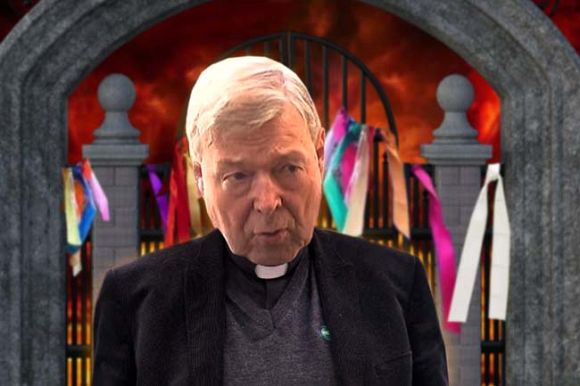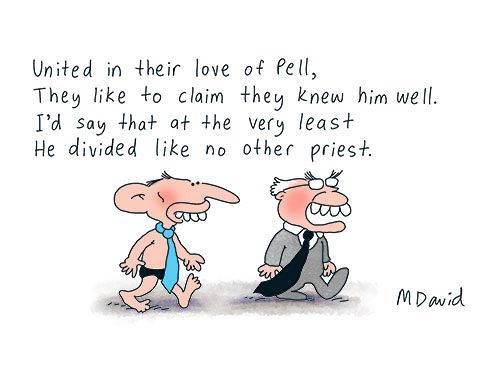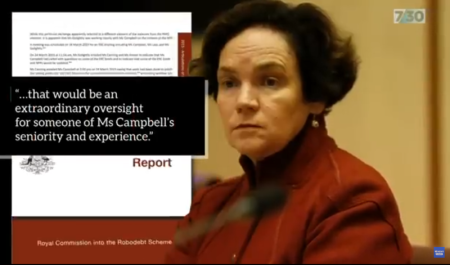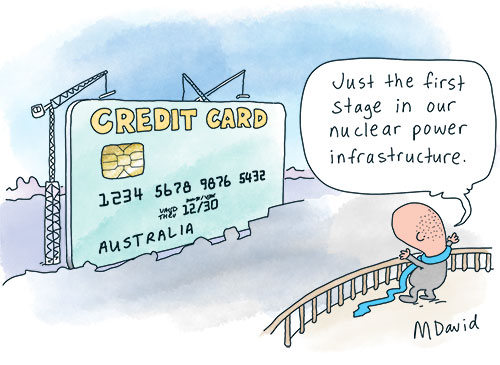Far from suggesting George Pell made any real lasting contribution to society, Tony Abbott's "saint for our times" eulogy was designed to fuel the culture wars, writes Michael Galvin.
*CONTENT WARNING: This article discusses child sexual abuse
AND WHAT DID the Romans ever do for us? You might remember the Monty Python film where these words come from. Or even more clearly, Noel Pearson’s eulogy for Gough Whitlam nearly a decade ago.
Pearson asked the rhetorical question and then reeled off a stunning list of reforms and achievements of the Whitlam Government. The list seemed never-ending and Pearson’s ability to bring enduring reforms to life again was a high point of his great speech that day. Few who heard it will ever forget it, or the man he was eulogising.
"And what did Pell ever do for us?” Instead of Pearson, it was Tony Abbott to whom the task fell last week to make a case for Pell’s life achievements. It was vintage Abbott and is the focus of this exegesis, to use a word Abbott probably loves.
Pell’s funeral was always going to be controversial, if only because he went to his grave as pugnacious and unbending as ever.
Consider this: neither the Prime Minister nor the premiers of NSW and Victoria, nor the NSW Labor Leader attended the funeral. And they are all Catholics. By contrast, John Howard, Tony Abbott and Peter Dutton were there.
This is the full list of Pell’s achievements in Abbott’s speech:
- the high offices Pell held in the church, in Australia and the Vatican;
- his role in the establishment of various institutions of higher learning in Australia;
- his attempts to reform the Vatican’s finances;
- Pell’s description of climate change activism as a “pseudo-religion” — “correctly”, Abbott couldn’t help adding;
- the first archbishop to sack “misbehaving” clergy; and finally
- his “crucifixion”, from which he emerged victorious and at least equal in holiness to such figures as Mother Teresa, Thomas Becket, and St Augustine.
Most of these claims are tendentious and standard Abbott-speak. All are success stories in Abbott’s mind. But there is a more fundamental question immediately apparent to a general audience: Is this all?
For a man of such prodigious learning, powerful position and purported courage of leadership, is this all he achieved in his 81 years of life, during half of which he was at least a bishop?
Two examples from Abbott’s list of supposed greatnesses stand out.
For example, Abbott told the funeral congregation that Pell was most proud of one tertiary college in particular: Campion College, which occupies an abandoned seminary in Sydney’s West. A quick look at this rather obscure college’s website reveals a "liberal arts" degree that would not have looked out of place in Cardinal Henry Newman’s time, as was no doubt the intention.
As Campion's president points out proudly, this is the place for Catholics to send their kids if they want to make sure they are not exposed to any of the loony Lefty nonsense (“critical theory” gets a special mention) that is taught in Australia’s secular universities. None of this focus on race, gender, cultural studies and so on that fragile 18-year-old Catholics might find distressing or challenging to their parents’ worldview.
Campion College started in 2006. Seventeen years later, it has a grand total of 160 students spread across four major fields of study taught over three years. Not hard to see why they can promise that seminar sizes will not exceed 20 per class! It appears as if most of the academic staff spend their time as Catholic pamphleteers rather than publishing in standard academic places. It would seem that Pell or his successors dropped the ball somewhere along the line — even if Pell would have favoured the emphasis on pamphleteering rather than serious tomes of theology or philosophy, he himself might have produced, but didn’t.
Another egregious example of high achievement: Pell, Abbott proudly declares, was the first archbishop to sack “misbehaving” priests rather than just shift them to another parish.
This is such a wonderful example of Abbott’s capacity to choose words as weapons to cause offence and mislead, at the same time as making a fool of himself, that it deserves special attention.
Firstly, as most readers would know, “misbehaving” is usually applied to children, not adults. Secondly, the word usually applies to relatively trivial things — certainly not rape, for example. Thirdly, to say that priests who were sexual predators of children “misbehaved” is obscenely and gratuitously inappropriate. Finally, Abbott has the gall to argue that Pell, far from being associated with endless cover-ups of sexual abuse – which will be his greatest legacy, here and around the world – was a courageous leader in the struggle against sexual abuse in the Catholic Church. It’s as if the Royal Commission evidence and reports never existed.
Abbott's eulogy culminated with Pell’s greatest “achievement” of all — his “crucifixion” (Abbott’s word) and subsequent resurrection at the hands of a secular system out to destroy him. Pell’s sufferings are such, according to Abbott, that they need more than 250 words of detail. By contrast, he devoted a mere 26 words to Pell’s achievements in dealing with child sexual abuse in the Catholic Church over a 40-year period since becoming a bishop in 1987. A startling disparity in emphasis, unmistakable in effect if not intention.
The "victim" Abbott shows he most cares about here is Pell.
Clearly, Abbott used Pell’s eulogy as an opportunity to make sure the culture wars continue after Pell’s death and to help build up the myth of Pell as a great, if now fallen, battle warrior. That is why these claims need to be dissected and exposed for their partisan meanings. In some ways, Abbott’s speech disrespects Pell as much as the rest of us since, In death, he is also being used.
What did Pell ever do for us? Did he leave his church or society with a lasting contribution to relevant knowledge? No.
Is he credited with any widespread return to traditional Catholic practice under his leadership? No.
Did any major church-building program take place under his watch? No (apart from the recycling of old seminaries and convents surplus to requirements).
Is his name synonymous with any pastoral innovation or movement that clearly benefitted any particular downtrodden segments of society? No.
What he is most known for is being a forceful chief executive of his own Church in Ballarat, Melbourne and Sydney, while child sexual abuse was occurring and being covered up on an industrial scale for a very long time.
Rather than praise Pell for his very modest achievements, it seems that he might be more deserving of our pity — at best a tragic hero brought down by his own fatal flaws in the manner of Lear or Othello.
Finally, Christian Porter is not a man of whom most readers of IA are likely to have a high opinion. But consider what he said this month at the Robodebt Royal Commission when asked whether he considered himself responsible:
“I do. I look back on this and I see myself through the correspondence getting quite close at points to taking the next step of inquiry. I didn’t do that. I wish now that I had…"
Porter is saying that his responsibility is not diminished because he didn’t know the details. He says he is accepting responsibility because he was the senior person at the time and he didn't ask the questions he should have asked in his position.
Not so Pell. If only Pell could have brought himself to accept responsibility in a similar way to Porter and confessed that he should have asked questions when he didn’t, thousands of people might have been able to go on living with a happier heart and fewer nightmares. But he didn’t.
If you would like to speak to someone about sexual violence, please call the 1800 Respect hotline on 1800 737 732 or chat online. For crisis support and suicide prevention call Lifeline on 13 11 14 or visit Lifeline.org.au.
Michael Galvin is an adjunct fellow at Victoria University and a former media and communications academic at the University of South Australia.
Related Articles
- The Liberal Party’s Tony Abbott reset
- 'Dobber King' Tony Abbott doesn't care for being dobbed upon
- CARTOONS: Mark David is Britain bound
- Pro-lifer turned end-of-lifer Tony Abbott AC, IPA, RC, PE, GWPF, WTF?!
- Brexit ho: Tony Abbott’s trade deal role
 This work is licensed under a Creative Commons Attribution-NonCommercial-NoDerivs 3.0 Australia License
This work is licensed under a Creative Commons Attribution-NonCommercial-NoDerivs 3.0 Australia License
Support independent journalism Subscribe to IA.















